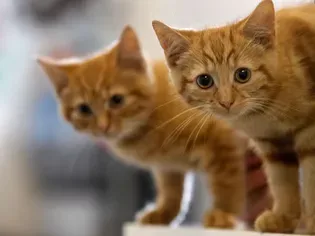Roundworms in Cats
Updated on 05/26/24

Unmasking the Invader: A Comprehensive Guide to Roundworms in Cats
Introduction
Welcome to our in-depth exploration of roundworms in cats, a prevalent parasite that can wreak havoc on your feline companion's health. This comprehensive guide will arm you with the knowledge to recognize, prevent, and treat roundworm infestations effectively.
What are Roundworms?
Roundworms are parasitic nematodes that reside in the digestive tract of cats. These cylindrical worms are white or cream-colored and can reach lengths of up to 6 inches. They feed on the nutrients in the cat's food, depriving the animal of essential vitamins and minerals.
Types of Roundworms in Cats
Several species of roundworms can infect cats, including:
* Toxocara cati: The most common roundworm in cats, transmitted through the ingestion of infected prey or contaminated soil.
* Toxocara canis: Similar to T. cati, but typically contracted from dogs.
* Ascaris lumbricoides: A large roundworm that can cause severe respiratory symptoms in kittens.
Transmission and Life Cycle
Cats can contract roundworms in a variety of ways:
* Ingestion of infected prey: Birds, rodents, and other small animals may harbor roundworm larvae.
* Ingesting contaminated soil or feces: Eggs passed in the feces of infected cats can survive for months in the environment.
* Nursing from an infected mother: Kittens can be infected through their mother's milk.
The life cycle of roundworms involves multiple stages:
1. Adult worms lay eggs in the gastrointestinal tract.
2. Eggs pass out in the feces into the environment.
3. Eggs develop into larvae within 2-4 weeks.
4. Larvae are ingested by a new host, where they mature into adult worms.
Symptoms of Roundworm Infection in Cats
Cats with roundworms may exhibit various symptoms, including:
* Weight loss: Worms compete for nutrients, leading to malnutrition.
* Diarrhea: Roundworms can cause irritation and inflammation in the intestines.
* Vomiting: Worms can be coughed up or vomited out by infected cats.
* Abdominal pain: Large numbers of worms can cause discomfort or pain in the abdomen.
* Coughing or difficulty breathing: Lungworms, which can develop from ingested larvae, can cause respiratory issues.
* Stunted growth: In kittens, roundworm infections can hinder development and growth.
Diagnosis of Roundworm Infection
Diagnosing roundworm infection in cats involves a physical exam and laboratory tests:
* Fecal examination: Microscopic analysis of the cat's feces can reveal the presence of roundworm eggs.
* Blood test: Elevated eosinophil levels, a type of white blood cell, may indicate a parasitic infection.
Treatment for Roundworms in Cats
Treating roundworm infections in cats involves the use of antiparasitic medications:
* Anthelmintics: These drugs specifically target and kill roundworms.
* Fenbendazole: A commonly used anthelmintic that is effective against most roundworms.
* Pyrantel pamoate: Another effective anthelmintic that is often given in multiple doses.
Prevention of Roundworm Infection in Cats
Preventing roundworm infection in cats is essential for maintaining their health and well-being:
* Regular deworming: Administer anthelmintic medications as recommended by your veterinarian, typically every 3-6 months.
* Control access to potential sources of infection: Keep cats away from areas where they may encounter infected prey or contaminated soil.
* Dispose of feces properly: Regularly clean up litter boxes and feces in the yard to prevent the accumulation of roundworm eggs.
* Practice good hygiene: Wash your hands after handling soil or feces, and encourage children to do the same.
Complications of Roundworm Infection
While most roundworm infections are treatable, complications can arise in severe cases:
* Intestinal obstruction: Large numbers of worms can block the intestines, requiring surgical intervention.
* Peritonitis: Roundworms can penetrate the intestinal wall and cause inflammation in the abdominal cavity.
* Pneumonia: Lungworms can lead to severe respiratory distress.
Conclusion
Roundworms in cats are a serious concern that can impact their health and well-being. By understanding the transmission, symptoms, diagnosis, treatment, and prevention of roundworm infection, you can protect your feline companion from this common parasite. Regular deworming, proper hygiene, and responsible pet ownership are crucial for maintaining the health and happiness of your beloved cat.
Explore More Pets

Cat Behavior Problems
How to Stop Aggression in Kittens

Long-Haired Cat Breeds
Siberian Cat: Breed Profile, Characteristics, & Care

Cat Behavior Problems
How to Stop Kittens From Scratching and Biting

Long-Haired Cat Breeds
Turkish Angora: Cat Breed Profile, Characteristics & Care

Basic Training
How to Socialize Your Kitten

Short-Haired Cat Breeds
Cute Pictures & Facts About Calico Cats & Kittens

Litter Box Training
Training Your Kitten to Use the Litter Box

Long-Haired Cat Breeds
10 Fun Facts About White Cats
